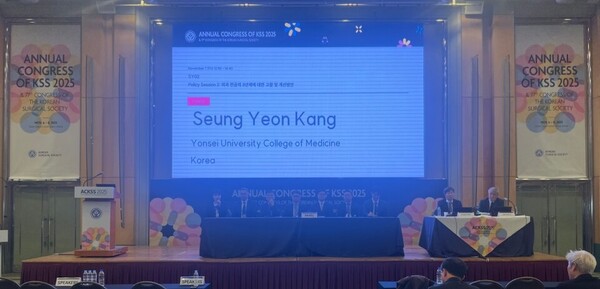
A Korean Surgical Society (KSS) survey found that over 90 percent of its members support a return to a four-year residency system.
The KSS discussed the “Three-Year Surgical Residency Program” last Friday at its 2025 Fall Academic Conference at the Swiss Grand Hotel.
At the session, Professor Choi Dong-ho of Hanyang University College of Medicine presented an analysis of the quantitative and qualitative effects of the transition to a shorter surgical residency training period. The analysis was based on a survey of 175 board-certified surgeons.

The survey showed that the majority of respondents found the three-year training insufficient for developing basic surgical skills: 50.9 percent said it was “very insufficient” for performing basic procedures, 41.6 percent said it was “somewhat insufficient,” and all agreed that the program did not help them acquire basic surgical skills.
Furthermore, 73.7 percent of respondents reported a very insufficient ability to independently perform moderate surgeries such as gallbladder and parathyroid operations, while 22.2 percent reported a somewhat insufficient ability.
Regarding emergency surgery response capabilities for perforations and abdominal trauma, 71.5 percent reported a very insufficient ability, and 24.4 percent reported a somewhat insufficient ability.
In other training areas, respondents reported insufficient exposure during the three-year residency. Specifically, 31.4 percent found understanding and participation in laparoscopic surgery “very insufficient” and 48.8 percent “somewhat insufficient.” For critical care management, 32.7 percent responded “very insufficient” and 48.5 percent “somewhat insufficient.” Regarding the ability to respond to postoperative complications, 34.3 percent said “very insufficient,” while 51.2 percent answered “somewhat insufficient.” For case experience, 49.7 percent cited “very insufficient” and 36.8 percent “somewhat insufficient.” In imaging interpretation beyond clinical skills, 26.9 percent chose “very insufficient” and 57.3 percent “somewhat insufficient.”
Overall, the survey indicated that the three-year program produces lower training outcomes than the four-year program in most areas.
When asked whether three years allowed participation in at least 100 surgeries per year and documentation of at least 80 surgeries per year, 90 percent of respondents said this was impossible or insufficient.
On potential advantages of the three-year program, 39.1 percent cited entering the field sooner, and 19.5 percent cited improved quality of life for residents. Meanwhile, 40.2 percent identified no advantages, and none said it improved residents’ competitiveness.
The survey concluded that 91.7 percent of respondents support returning to a four-year residency, while only 3 percent opposed the change.
For supplementary measures in surgical training, 34.5 percent of respondents favored enhancing simulation education. Introducing a skills exam was supported by 31.0 percent, legally securing training time within working hours by 14.3 percent, and expanding dispatch training by 4.8 percent.
Additional comments included a perceived gap between graduation and achieving surgical proficiency, concerns that reducing resident working hours could worsen existing problems, and criticism that a shortened system pressures residents into full-time positions solely to obtain board certification earlier. Some respondents called for a prompt return to the four-year system.
Conversely, some expressed skepticism about returning to a four-year system. They argued that such a change could further decrease applications to surgical residencies, suggesting that a longer training period might be viewed primarily as a measure to address workforce shortages resulting from reduced residency hours. Others voiced concern that normal training challenges would persist even if the period was extended, given the ongoing impact of reduced working hours.
Professor Choi stated, “Following the medical crisis, further reductions in training hours require improvements in both the quantity and quality of training. If these reductions hinder the achievement of minimum professional competencies, adjustments to the training period, such as a four-year system, should be considered.”
He added, “Training programs must comply with the 72-hour weekly limit and 24-hour consecutive duty restrictions. Before considering a return to the four-year system, we must discuss potential reforms to enhance training quality, including a new competency-based model.”
In the same session, Professor Ji Woong-bae of Korea University College of Medicine presented “The Impact of Training Period Shortening on Surgical Specialist Education and Career Paths.”
Professor Ji noted that after the transition to a three-year program, female surgical specialists continued to enter tertiary hospitals at high rates. However, for males, the rate of working at tertiary hospitals decreased by 8 percentage points, compared to a 6-percentage-point decrease for females. Male career paths diversified toward general hospitals and private clinics.
Bang Young-sik, director of the Medical Workforce Policy Division at the Ministry of Health and Welfare, said that reinstating the four-year system requires careful review.
Bang explained, “The 2019 transition to a three-year surgical residency program reflected government consideration and input from the academic community. If the society gathers opinions on a potential return to four years, it could aid policy reflection.”
Despite survey results showing over 90 percent support for returning to a four-year program, the official said the issue should not be decided solely on the basis of training length.
Bang added that the matter is linked to fundamental issues such as the curriculum, the implementation of field-centered training, and the determination of the appropriate number of surgical residents. He expressed hope for active discussion.
Related articles
- Surgeons sound alarm over collapse of surgical field, call for national countermeasures
- Despite a thaw in conflict, essential departments worry about lack of trainee doctors
- How Korea's top surgeons learned with pig organs and passion
- Korean researchers 1st in Asia to link Lynch syndrome to gastric cancer
- Medtronic opens Korea's 1st robotic surgery research and training center in Osong

